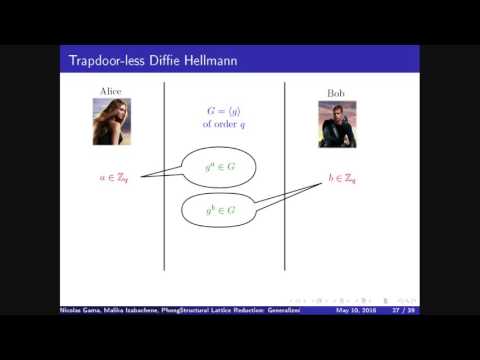Welcome to the resource topic for 2014/283
Title:
Structural Lattice Reduction: Generalized Worst-Case to Average-Case Reductions and Homomorphic Cryptosystems
Authors: Nicolas Gama, Malika Izabachene, Phong Q. Nguyen, Xiang Xie
Abstract:In lattice cryptography, worst-case to average-case reductions rely on two problems: Ajtai’s SIS and Regev’s LWE, which both refer to a very small class of random lattices related to the group G=\mZ_q^n. We generalize worst-case to average-case reductions to all integer lattices of sufficiently large determinant, by allowing G to be any (sufficiently large) finite abelian group. In particular, we obtain a partition of the set of full-rank integer lattices of large volume such that finding short vectors in a lattice chosen uniformly at random from any of the partition cells is as hard as finding short vectors in any integer lattice. Our main tool is a novel generalization of lattice reduction, which we call structural lattice reduction: given a finite abelian group G and a lattice L, it finds a short basis of some lattice \bar{L} such that L \subseteq \bar{L} and \bar{L}/L \simeq G. Our group generalizations of SIS and LWE allow us to abstract lattice cryptography, yet preserve worst-case assumptions: as an example, we provide a somewhat conceptually simpler generalization of the Alperin-Sheriff-Peikert variant of the Gentry-Sahai-Waters homomorphic scheme. We introduce homomorphic mux gates, which allows us to homomorphically evaluate any boolean function with a noise overhead proportional to the square root of its number of variables, and bootstrap the full scheme using only a linear noise overhead.
ePrint: https://eprint.iacr.org/2014/283
Talk: https://www.youtube.com/watch?v=hdQMfrYwjyw
See all topics related to this paper.
Feel free to post resources that are related to this paper below.
Example resources include: implementations, explanation materials, talks, slides, links to previous discussions on other websites.
For more information, see the rules for Resource Topics .
